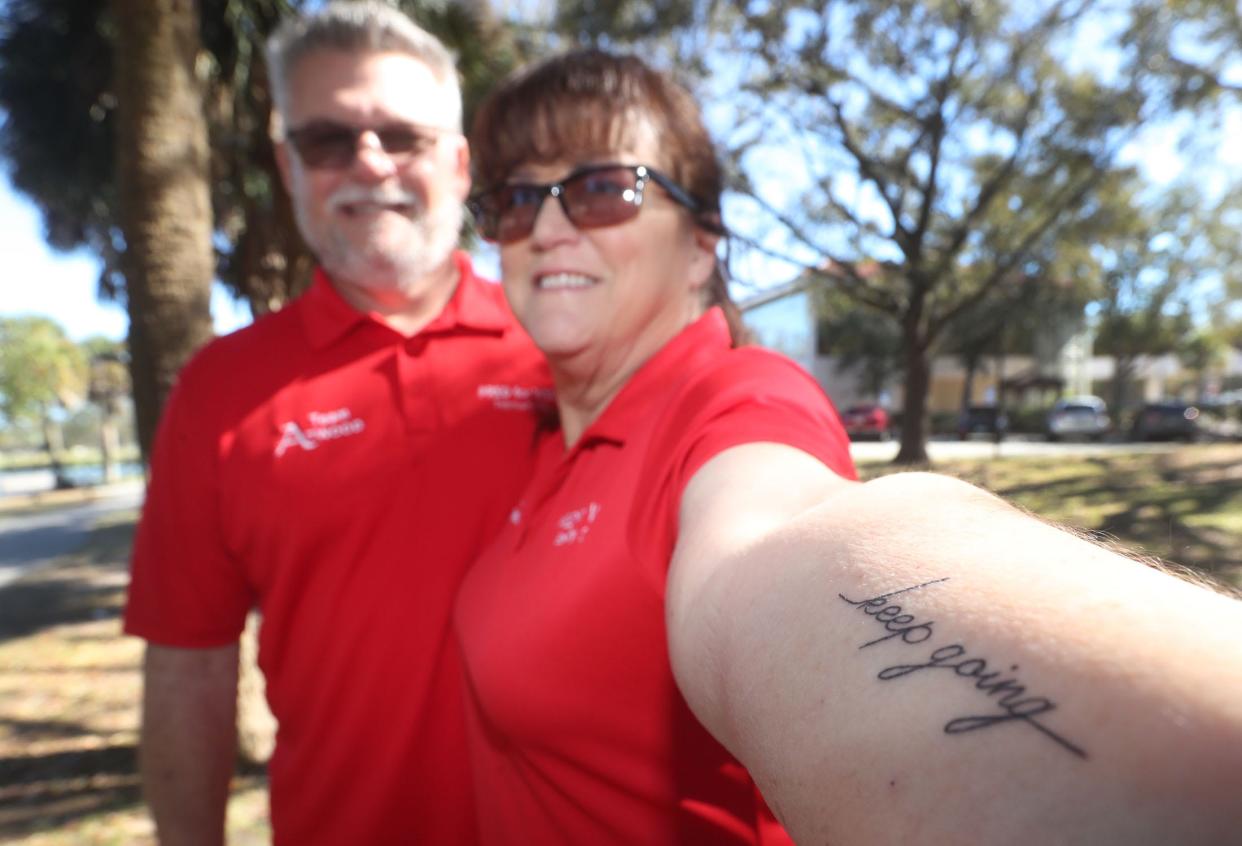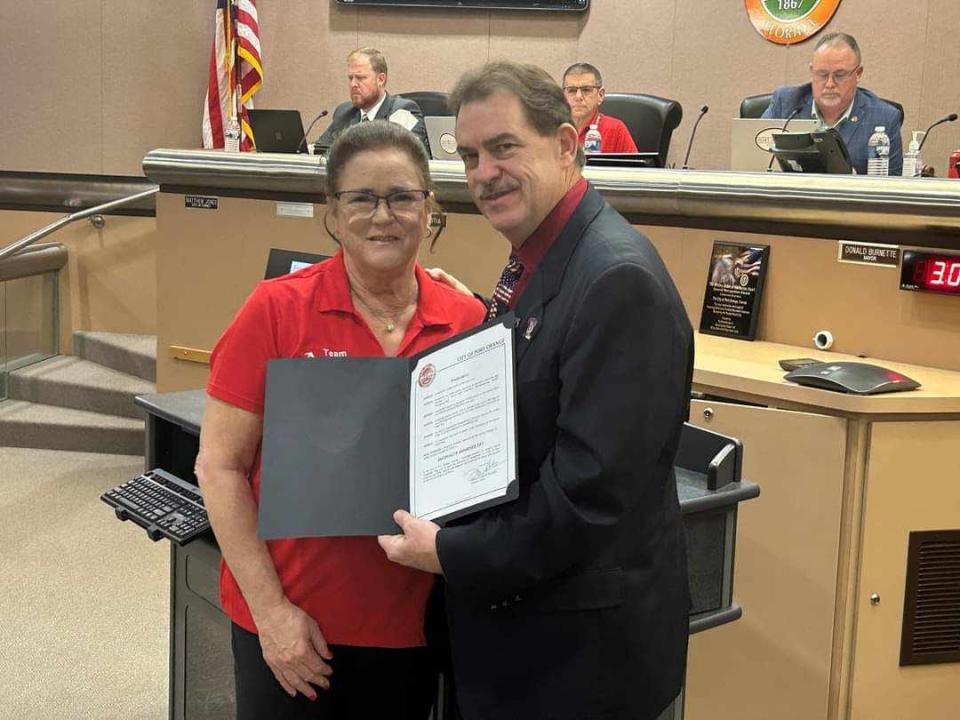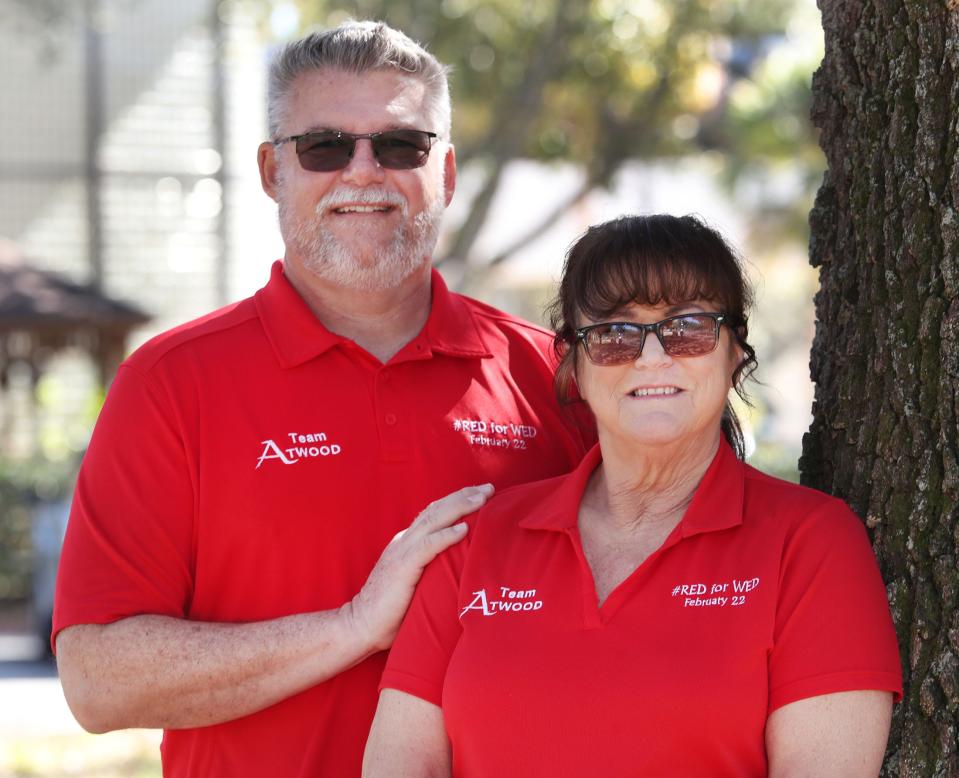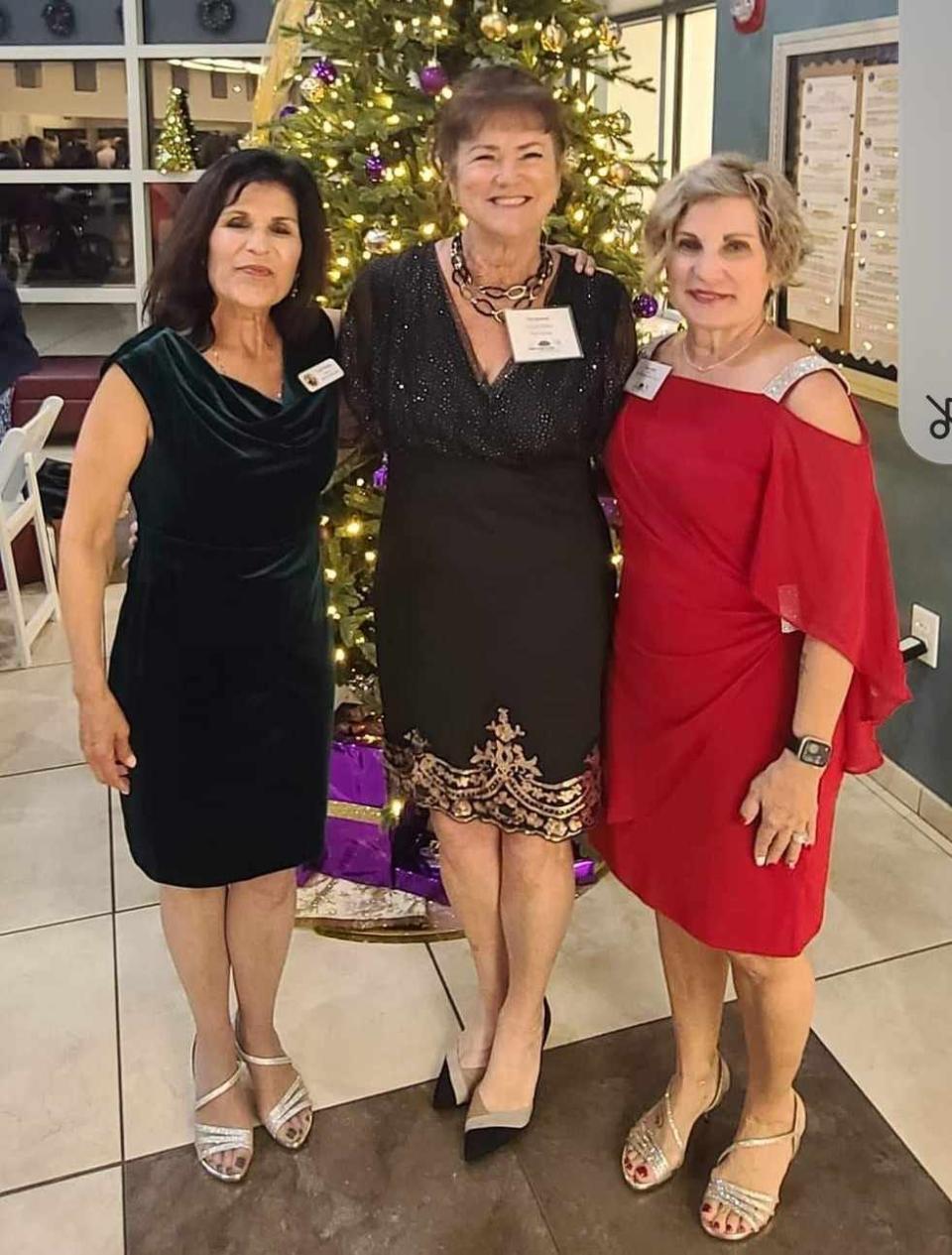Kat Atwood had never heard of encephalitis until one seizure completely upended her life

Kat Atwood sat at her desk, reading about Port Orange City Council business in anticipation of taking office in November 2022, less than two months away.
Atwood, then a 58-year-old Navy retiree, said her mind was sharp, "a steel trap." She was in peak athletic condition, having run half-marathons all over the United States. She was a trained pastry chef. And she had recently won her seat on the council, an extension of her public service.
Suddenly, her body shook violently enough to cause a back injury. She bit her tongue, which bled. She made enough noise to get the attention of her husband Ken, who didn't know what was happening. He attempted to steady her while calling 911.
The grand mal seizure was the first clue in what would become a yearlong medical mystery. During that time, she suffered more seizures, memory loss, shortness of breath and physical coordination that came and went. What took so long was that encephalitis − particularly the autoimmune version contracted by Kat − can be an elusive affliction.
That's partly why Atwood agreed to become a "poster child" for the disease, which is pronounced in the United States as en-SEFA-light-iss, although the British tend to call it en-KEFA-light-iss.
In preparation for World Encephalitis Day on Thursday, Atwood has launched an awareness campaign, reaching out to cities across Volusia County, speaking at city council meetings, getting proclamations and promises from elected officials to light symbolic buildings, such as city halls, in red, the color the campaign has adopted.

"Our mission right now is to raise awareness, because nobody knew what I had," Atwood said.
An attack on the brain
There are two main types of encephalitis: autoimmune and viral. The viral version accounts for about 70% of cases, according to the National Institutes of Health. It is contracted through an outside source such as a virus, bacteria or fungus. Most commonly in the United States, it comes from a herpes simplex virus of the mouth or West Nile virus, but there are many other causes.
Viral encephalitis − like autoimmune encephalitis − attacks the brain, which causes swelling and triggers all sorts of problems, such as memory loss, changes in personality, neurological disorders, seizures and, in as many as 40% of cases, death, according to Encephalitis International, a United Kingdom-based nonprofit.
Autoimmune encephalitis comes from antibodies within a person's blood. Atwood's is LGI-1, but there are more than two dozen others that essentially erroneously identify something in the brain to attack, although science hasn't quite caught up to why.
When they attack, they cause swelling, which can sometimes be visible on an MRI, but not always, said Dr. Sarosh Irani, a neurologist at Mayo Clinic in Jacksonville.
"And what happens, as far as we understand, is that the immune system which should normally clear bugs sees the brain as a bug almost, as foreign, and tries to attack the brain, so like an error,” he said in a phone interview Tuesday.
The story of autoimmune encephalitis often involves delayed (if not missed) diagnosis, researchers including Dr. Ava Easton, chief executive of Encephalitis International, said in a Zoom interview Tuesday.
"One of the problems with the autoimmune encephalitis is that initially (patients) can present very psychiatric in nature, and so they’re often misdiagnosed and pushed down psychiatric pathways until something more serious happens, like a seizure or something that indicates to people that there is something neurological going on," Easton said.
Irani, who last year moved from the University of Oxford in England to establish a new lab for researching immunology of the brain, said the symptoms combined with the varied nature of those who suffer from encephalitis make it challenging to diagnose.
"It can affect 2-month-old kids. It can affect 80-year-olds. It can affect men; it can affect women," Irani said. "It can affect all ethnicities, and because it has that variability, it also has variability in symptoms.
"You can imagine a 3-month-old presenting with behavioral problems or a 70-year-old who presents with a seizure," he said. "And you’ve got to think of encephalitis in the same bracket, so it can be quite hard.”
Survey: Most healthcare professionals don't think of encephalitis
Encephalitis isn't among the leading causes of death and isn't among the most common diseases. But it does strike 10 to 15 people per 100,000 every year, with more than 250,000 people diagnosed in the United States in the past decade, according to Johns Hopkins Medicine.
Easton said 8 in 10 people worldwide have never heard of encephalitis.
And Encephalitis International recently surveyed emergency doctors and nurses in six countries.
“We found that more than half of them didn’t consider infectious encephalitis when presented with a commonly accepted list of the symptoms,” Easton said.
The recognition of both types of encephalitis was even worse in the United States, where 62% of medical professionals didn't consider viral encephalitis, and 81% didn't think of the autoimmune variety.
Easton said a hopeful takeaway from the survey was that 85% of emergency physicians and nurses agreed there would be a benefit to additional training about the condition. So that training has become Encephalitis International's next campaign.
“I would love for there to be a day when encephalitis ... is at the forefront of people’s minds in the same way that they’re aware of meningitis and sepsis, for example,” Easton said.

Atwood's journey: Lots of tests, few answers
With people who contract viral encephalitis, the symptoms can come on fast, sometimes within a few days: high temperature, headache, sensitivity to light, malaise, and stiffness. Later, there can be changes in personality, confusion or hallucinations, changes in senses, memory loss, paralysis, loss of consciousness and coma, according to Mayo Clinic.
For autoimmune encephalitis sufferers, it’s often more of a journey, Easton said, with symptoms typically occurring over weeks.
Atwood said she didn't know anything was wrong until the first seizure on Sept. 15, 2022. She was taken to Halifax Health in Daytona Beach for several days, but multiple tests did not identify a cause.
Atwood has no memory of any of her seizures.
“I woke up in the hospital and asked (Ken) where I was. That’s all I remember," she said.
Ken Atwood said after he first was allowed to see his wife a few hours after the initial seizure, she seemed to be normal.
"And then all of a sudden, she looked off in the distance," he said. "Her memory was gone. ... And it’s been like that ever since.”
She was given seizure medicine and referred to a local neurologist.
Atwood had another seizure in November.
This led to multiple hospital stays and batteries of tests. She saw the neurologist, her local primary care physician and her Veterans Administration doctor and all were "stumped." In the meantime, she had more seizures, her memory loss worsened and she started having episodes of breathing difficulty.
She got a referral to the Mayo Clinic. Because its Jacksonville campus was booked, as were other Florida options, Ken Atwood decided to set up an appointment at the Mayo Clinic in Phoenix, Arizona.
It was October 2023 when she finally received her diagnosis: autoimmune encephalitis LGI-1.
Part of her treatment involves blood infusions to suppress the immune system.
How she feels depends on the day. Some days, she's good, at least for a few hours. Others, she needs to use a walker.
"I can't regulate my body temperature," she said. "I'm either like inferno-hot or ice cold."
What she remembers, and forgets is random
She said she has suffered "a lot" of memory loss: She recognizes faces but can't recall names the way she did on the campaign trail. For her 60th birthday party recently, the Atwoods asked guests to wear nametags.
"We encouraged them to speak with each other if they didn't know each other, but it really was for me," she said, "so I didn't get embarrassed by not knowing who I was talking to."
Atwood, a social media user, said she uses Facebook Memories to trigger her mind, asking Ken who people are and when things occurred.
People sometimes joke with her about the movie "50 First Dates," a rom-com in which a guy meets the girl of his dreams only to discover she has short-term memory loss and each day he has to reintroduce himself to her.
Her memory loss is random: some short-term, some longer-term.
But Atwood said she's "blessed" that she hasn't forgotten her husband, parents and children.
Once a runner, Atwood has given that up, but has instead participated in some recent 5K races, walking the route, rather than running. At one of the 5Ks, some friends she used to run with completed their races, then ran back to Kat and Ken Atwood to walk the rest of the way with them.
Her most proud accomplishment of late, she said, has been contacting the mayors of all 16 municipalities and getting nine of them to recognize World Encephalitis Day.
Part of the effort involves lighting landmarks in red. Cities participate worldwide, Easton said, with Niagara Falls, Liberty Place in Philadelphia, Boston City Hall and Johns Hopkins Hospital in Baltimore being among them.
Several Volusia County cities will light landmarks in red, including South Daytona, which will spotlight its city markers along U.S. 1 for 24 hours.
"The city gets involved with a lot of good causes. This is an excellent cause to get involved in," South Daytona Mayor Bill Hall said.

Ponce Inlet Mayor Lois Paritsky said Atwood gave a presentation at the Jan. 18 Town Council meeting. She shared a video, talked about the disease and her struggles and asked for the World Encephalitis Day proclamation.
"Ponce Inlet’s Town Hall, police station and fire station will be lit in honor of this important day," Paritsky said.
This article originally appeared on The Daytona Beach News-Journal: Port Orange woman works to raise profile of World Encephalitis Day

